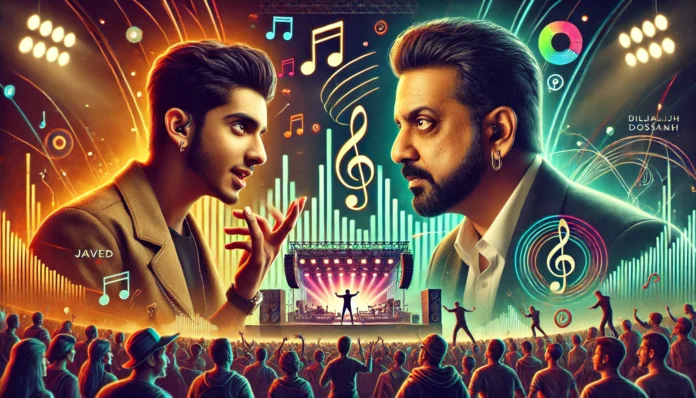In the ever-evolving world of Indian entertainment, discussions around concert infrastructure and opportunities for artists have taken center stage. Recently, acclaimed singer Diljit Dosanjh made headlines with his candid remarks about India’s concert infrastructure, sparking reactions from various artists within the industry. One prominent voice in the discussion is that of Javed Ali, a celebrated playback singer known for his versatile singing style. In this article, we will explore what Javed Ali has to say regarding Diljit Dosanjh’s comments and delve into the implications for the Indian music industry.
What Did Diljit Say?
Diljit Dosanjh, during a recent interview, voiced his concerns about the state of concert infrastructure in India. His comments highlighted several key issues, including:
- Lack of Modern Facilities: Dosanjh pointed out that many venues lack the necessary equipment and facilities to host large-scale concerts effectively.
- Safety Concerns: He emphasized the importance of safety and crowd management, noting that inadequate infrastructure could pose risks during events.
- Support for Artists: Dosanjh called for better support for artists, both in terms of logistics and promotion, to enhance their performance experiences.
The Impact of His Statements
Dosanjh’s bold remarks resonated with many artists and industry professionals, sparking a broader conversation about the challenges faced in the live music scene in India. His comments also ignited debates on social media, drawing mixed responses from fans and fellow artists alike.
Javed Ali’s Perspective
1. Acknowledgment of Issues
In response to Diljit Dosanjh’s comments, Javed Ali acknowledged the validity of Dosanjh’s concerns. He expressed understanding about the challenges artists face regarding concert infrastructure, emphasizing the need for improvements.
- Quote from Javed Ali: “Diljit has raised an important issue that many of us have faced. The infrastructure is crucial for us to deliver our best performances.”
2. The Need for Collaboration
Javed Ali called for collaboration among artists, promoters, and venue owners to address these infrastructure problems. He believes that a united approach could lead to substantial improvements in the concert experience for both artists and fans.
- Key Point: “We need to work together to enhance the live concert experience. It’s not just about the performance but also ensuring safety and comfort for everyone involved.”
3. Encouraging Growth in the Industry
Ali also spoke about the potential for growth in the Indian music industry, particularly in live performances. He emphasized that with the right infrastructure, India could host world-class concerts that attract international attention.
- Vision for the Future: “If we invest in better infrastructure, we can elevate Indian music on the global stage and offer audiences an unforgettable experience.”
The State of Concert Infrastructure in India
Current Challenges
The concerns raised by Diljit Dosanjh and echoed by Javed Ali highlight several ongoing challenges in India’s concert infrastructure:
- Limited Venue Options: Many cities lack venues that can accommodate large crowds safely and comfortably.
- Technological Shortcomings: A significant gap exists in the availability of modern sound and lighting equipment, which can affect the quality of performances.
- Regulatory Hurdles: Artists often face bureaucratic challenges that complicate the organization of events.
The Way Forward
To address these challenges, industry stakeholders can consider the following:
- Investment in Venues: Increased investment in building and upgrading venues that meet international standards.
- Training for Staff: Providing training for event staff on crowd management and safety protocols.
- Government Support: Seek support from local governments to facilitate smoother event planning and regulatory approvals.
Reactions from the Music Community
The dialogue initiated by Diljit Dosanjh’s comments and furthered by Javed Ali has sparked widespread discussions within the music community.
Positive Resonance
Many artists and industry professionals have applauded both singers for bringing attention to these crucial issues:
- Support from Peers: Fellow artists expressed their agreement with the need for better infrastructure and praised Dosanjh for his courage in speaking out.
Criticism and Skepticism
On the other hand, some critics argue that while the concerns are valid, artists should also take on a level of responsibility for advocating for better conditions.
- Counterarguments: Some believe artists should leverage their platforms to push for change rather than merely voicing complaints.
Conclusion
Javed Ali’s response to Diljit Dosanjh’s remarks sheds light on an essential conversation regarding the state of concert infrastructure in India. As both artists emphasize the importance of collaboration and investment in the music industry, there is hope for a brighter future for live performances.
Final Thoughts
The music industry in India is at a pivotal point where addressing infrastructure challenges could lead to significant growth. By working together, artists, promoters, and stakeholders can help elevate the concert experience, ensuring that both performers and audiences reap the benefits.


